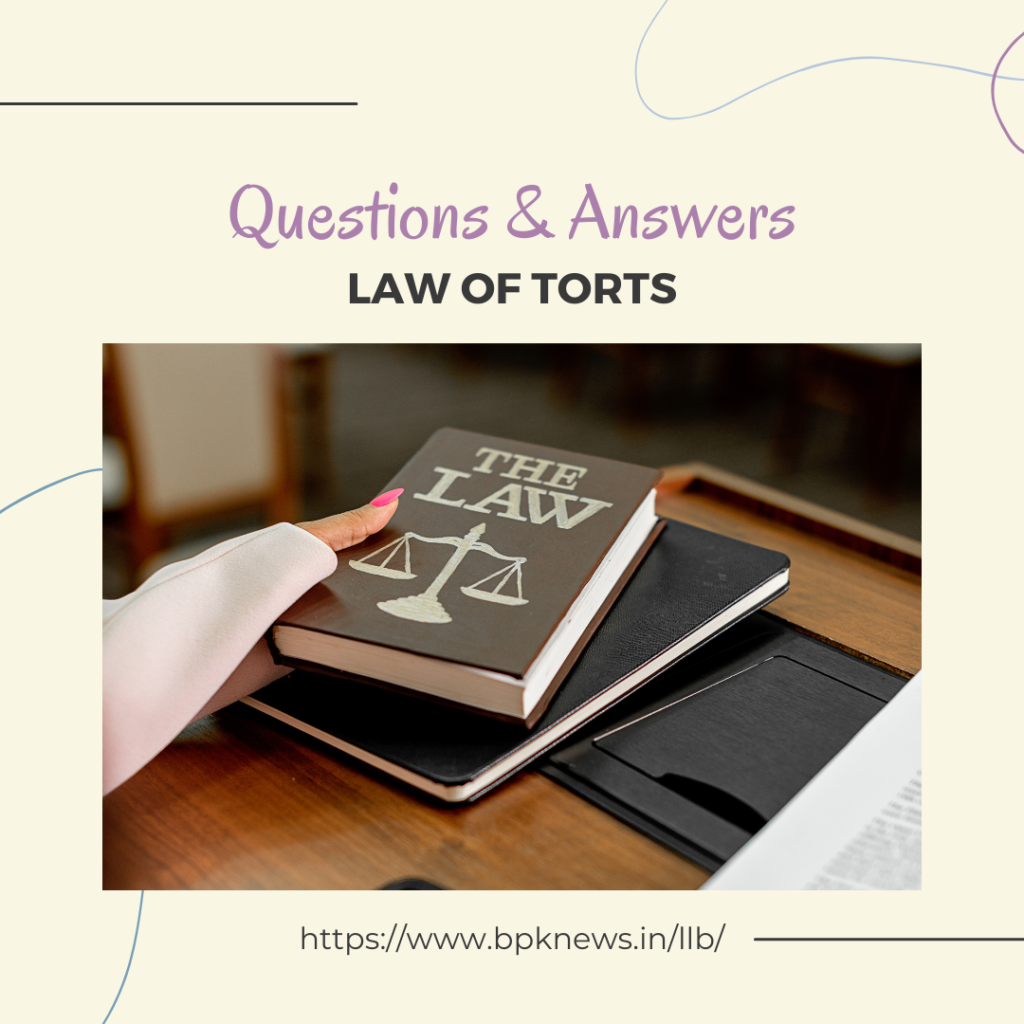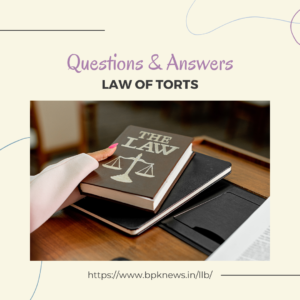LAW OF TORTS INCLUDING MOTOR VEHICLE ACT & CONSUMER PROTECTION ACT MID EXAM – I
LAW OF TORTS INCLUDING MOTOR VEHICLE ACT & CONSUMER PROTECTION ACT MID EXAM – I
- Res Ipsa- Loquitur
- Actio personalis moritur cum persona
- Sovernity
- Contributory negligence
- Tort
- Define Nervous shock and explain with decided cases
- An Unlawful trespasser becomes a lawful trespasser. Explain with case law
- ‘A’ a banker refuses to honor a customer’ cheque though customer is having sufficient money in the account. Whether any action lay against banker? Decide.
- ‘X’ points a gun at ‘Y’ ‘X’ knows while ‘Y’ does not known that the gun is loaded. Has ‘X’ committed any tort
Write short notes on any two of the following questions Part A (2*3=6 marks)
1.Res Ipsa- Loquitur
Res Ipsa Loquitur is a legal doctrine that allows the presumption of negligence in a case where the nature of an accident or injury implies it was likely caused by someone’s negligence, even without direct evidence of the defendant’s actions.
2. Actio personalis moritur cum persona
According to this legal adage, a person’s obligations and remedies are nullified upon their death, and their tort and contract proceedings cease. But eventually, the (Misc. Provs.) Act, 1934, which changed the legislation, overturned the ruling, saying that “On the death of any person-all causes of actions vested in him shall survive for the benefit of his estate.” As a result, all tort claims, such as those for defamation and grief damages, survived the death of the individual.
3. Sovernity
Sovereignty is the title given to the individual, group, or organization that has the last say over other people and can make new laws or amend ones that already exist.
4. Contributory negligence
In a personal injury lawsuit, the plaintiff has to establish that the defendant should have been held financially liable for the injury, caused the injury, and did not act reasonably under the circumstances.
5. Tort
A tort is a civil wrong (as opposed to a contract violation) for which the injured person may be entitled to damages or other suitable redress under the law.

Answer any one of the following questions Part B (1*7=7 marks)
6. Define Nervous shock and explain with decided cases
Nervous shock, also known as emotional distress or psychological injury, refers to a psychiatric or psychological condition resulting from a traumatic event or experience. It can manifest in various forms, including anxiety, depression, post-traumatic stress disorder (PTSD), and other psychological disorders.
In legal terms, nervous shock typically arises in the context of tort law, where individuals seek compensation for the emotional harm they have suffered due to the negligent or intentional actions of another party. However, establishing liability for nervous shock can be complex and often requires meeting specific legal criteria.
Here are a couple of examples of cases involving nervous shock:
1.Alcock v Chief Constable of South Yorkshire Police (1992): This case involved the Hillsborough disaster, where a crush occurred during a football match in Sheffield, England, resulting in the deaths of 96 people. The families of some of the victims brought claims for nervous shock against the police for their alleged negligence in crowd control. The House of Lords (the highest court in the UK at the time) established criteria for recovering damages for nervous shock in such cases. These criteria include the requirement for the claimant to have a close relationship of love and affection with the victim, to have witnessed the event firsthand, or to have arrived at the scene shortly afterward and suffered a sudden and shocking experience.
2.Page v Smith (1996): In this case, the plaintiff was involved in a car accident caused by the defendant’s negligence. Although the physical injuries sustained by the plaintiff were relatively minor, he developed chronic fatigue syndrome (CFS) as a result of the accident. The House of Lords held that nervous shock resulting in physical harm (such as CFS) could be compensable, even if the physical injury was not immediately apparent at the time of the accident. This decision expanded the scope of liability for nervous shock in English law.
These cases illustrate the challenges and complexities involved in proving liability for nervous shock in tort law. Courts often consider factors such as the foreseeability of the harm, the proximity of the relationship between the plaintiff and the traumatic event, and the severity of the emotional distress suffered by the plaintiff. Additionally, the law surrounding nervous shock may vary depending on the jurisdiction and specific circumstances of each case.
7. An Unlawful trespasser becomes a lawful trespasser. Explain with case law
The The concept of an unlawful trespasser becoming a lawful trespasser is often associated with the legal doctrine of “licensee by invitation” or “implied invitation.” This occurs when someone enters onto another person’s property without permission (making them an unlawful trespasser) but then receives an invitation or permission to remain on the property, transforming them into a lawful trespasser.
Here’s an explanation with an example case:
Case: Rowland v. Christian (1968)
In the case of Rowland v. Christian, the California Supreme Court addressed the issue of a landlord-tenant relationship and the duty owed by the landlord to the tenant and other occupants of the property. In this case, Rowland was a tenant in a residential building owned by Christian. Rowland’s guest, Duffy, was injured while on the premises due to a dangerous condition of the property.
The court held that a landlord owes a duty of care to all lawful visitors on the property, regardless of whether they are tenants or guests of tenants. This duty includes maintaining the property in a reasonably safe condition and warning visitors of any known hazards.
However, the court also discussed the concept of implied invitation. It noted that even if someone enters the property initially as an unlawful trespasser, they may become a lawful trespasser if the landowner subsequently extends an invitation or permission for them to be on the property. Once such an invitation is extended, the landowner owes a duty of care to the visitor.
In the context of Rowland v. Christian, if Duffy had entered the property initially without permission (making him an unlawful trespasser), but Rowland or Christian subsequently invited him to remain on the premises, Duffy would become a lawful trespasser, and the duty of care owed by Christian as the landlord would extend to Duffy.
This case highlights the legal principle that an unlawful trespasser can become a lawful trespasser through the granting of permission or invitation by the property owner, which in turn may create duties and responsibilities owed by the property owner to the visitor.
Answer any one of the following questions Part C (1*7=7 marks)
8. ‘A’ a banker refuses to honor a customer’ cheque though customer is having sufficient money in the account. Whether any action lay against banker? Decide.
In this scenario, if the banker (party A) refuses to honor a customer’s cheque despite the customer having sufficient funds in their account, it could potentially constitute a breach of contract or breach of duty owed by the banker to the customer.
When a customer opens an account with a bank, there is an implied contract between the customer and the bank. As part of this contract, the bank agrees to provide certain banking services, including honoring valid checks drawn on the customer’s account, as long as the customer has sufficient funds available to cover the transaction.
If the banker refuses to honor a customer’s check without valid reasons, such as insufficient funds or suspicions of fraud, it may be considered a breach of contract. The customer may have legal grounds to take action against the banker for damages resulting from the refusal to honor the check.
Additionally, banks are subject to various regulations and legal obligations governing their operations, including the obligation to provide banking services in a fair and nondiscriminatory manner. If the refusal to honor the customer’s check is found to be unjustified and discriminatory, the customer may also have grounds to pursue legal action against the bank for violating banking regulations or consumer protection laws.
However, it’s essential to consider the specific circumstances surrounding the refusal to honor the check, as there may be legitimate reasons for the banker’s actions, such as suspected fraud or compliance with legal requirements. Consulting with a lawyer experienced in banking law would be advisable to assess the customer’s legal options and determine the appropriate course of action.
9. ‘X’ points a gun at ‘Y’ ‘X’ knows while ‘Y’ does not known that the gun is loaded. Has ‘X’ committed any tort
In Yes, in the scenario you described, ‘X’ could potentially be held liable for committing the tort of assault. Assault, in tort law, does not necessarily require physical contact but rather involves intentionally causing another person to fear imminent harmful or offensive contact.
Pointing a gun at someone can reasonably cause fear of imminent harm, especially if ‘Y’ is unaware that the gun is loaded. Even if ‘X’ knows the gun is unloaded, if ‘Y’ reasonably believes the gun is loaded, it can still constitute assault because ‘X’ intentionally creates a reasonable apprehension of harmful or offensive contact.
However, it’s important to note that the specific legal implications and potential liabilities can vary depending on the jurisdiction and the circumstances surrounding the incident. In some cases, ‘X’ might also face criminal charges in addition to civil liability for assault. Therefore, it’s advisable for ‘Y’ to seek legal counsel to understand their rights and options for recourse.
Website : https://www.bpknews.in
Youtube : https://www.youtube.com/bpknews
Facebook : https://www.facebook.com/bpknews
Instagram : https://www.instagram.com/bpknews
Twitter : https://twitter.com/bpknews
Pinterest : https://in.pinterest.com/bpknews



